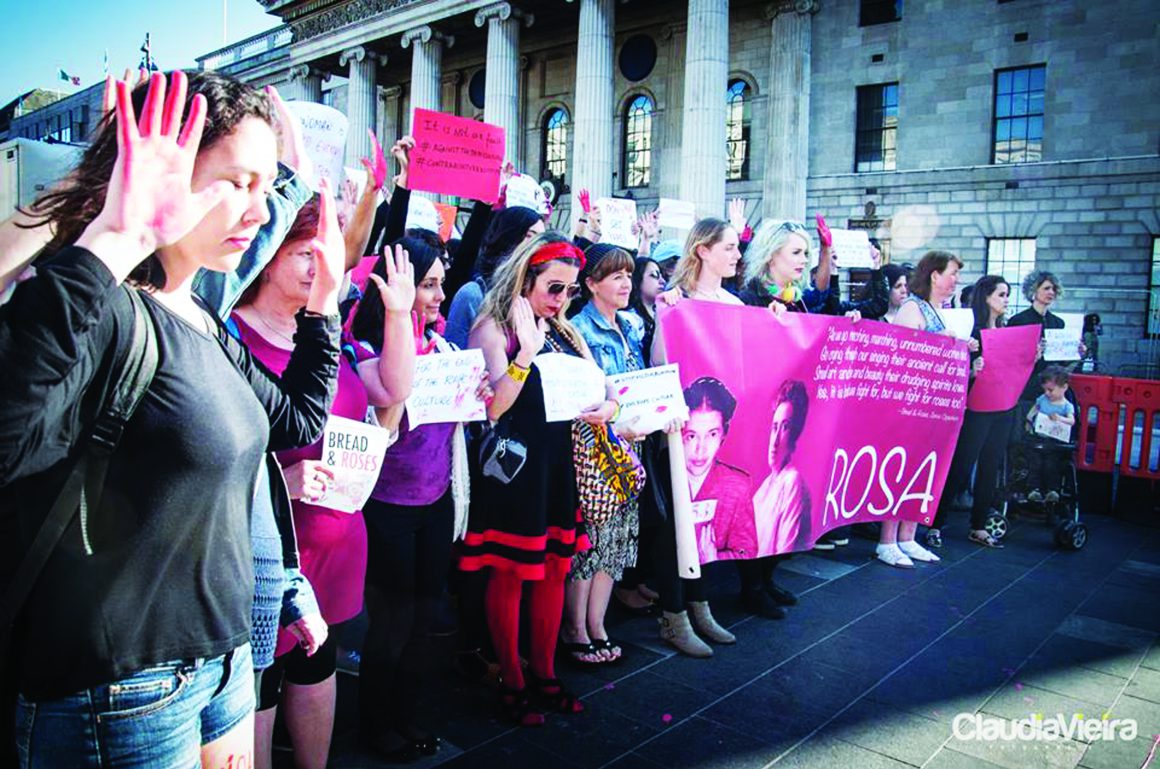In light of the emergence of a new generation who are seeking answers to how to fight sexism, Laura Fitzgerald makes the case for a socialist feminist movement.
“And finally, to girls everywhere I am with you. On nights when you feel alone, I am with you. When people doubt or dismiss you, I am with you. I fought every day for you. So never stop fighting. I believe you. Lighthouses don’t go running all over an island looking for boats to save; they just stand there shining. Although I can’t save every boat, I hope that by speaking today, you absorbed a small amount of light, a small knowing that justice was served, a small assurance that we are getting somewhere, and a big, big knowing that you are important, unquestionably, you are untouchable, you are beautiful, you are to be valued, respected, undeniably, every minute of every day, you are powerful and nobody can take that away from you. To girls everywhere, I am with you. Thank you.”1
This is the conclusion of the powerful victim impact statement of a 23 year old US woman that went viral on social media and was read out in full on a US national news channel. Her attacker, Brock Turner, was a Stanford student not known to her, who brought her to a secluded area near a student party that he met her at. She was intoxicated and unconscious when he sexually assaulted her. Two young men on bicycles, students from Sweden, interrupted the attack and chased and caught Turner. The victim touchingly explains how she sleeps with a picture of two bicycles over her bed to remind her to have optimism.
In the 7,000 word victim impact statement she also lacerated the criminal justice system and the media who minimised the crime committed against her, a crime that she explains had a catastrophic impact on her health and life. Brock Turner, a young white Stanford student and, as the media and his lawyers kept repeating, a competitive swimmer, was handed down a sentence of six months in county jail – in a country that incessantly hands down a decade or decades in prison for young people of colour for non-violent drugs charges.
A new feminist wave?
The Stanford rape case that went to trial in June 2016, had a colossal resonance globally. This is because one in three women around the world will experience physical or sexual violence during her life.2 It’s also because globally, there is the outline of a new women’s movement. A new generation of young women are being radicalised by continued women’s and LGBTQ oppression, identifying as feminist, and in some instances engaging in political action. They have fought for reproductive rights, in Ireland, Poland and the Spanish state, and elsewhere. They have challenged a culture of victim-blaming and male violence and sexual violence against women and children, including on US campuses. And they have participated in mobilisations that have erupted across Latin America as well as the ‘Rage Against Rape’ explosions of protests in India in 2013.
Commentators are deeming this a new feminist wave. This wave is inherently affirming of LGBTQI+ people, and rejects rigid gender norms socially-imposed in capitalist society. It rejects all essentialising of womanhood that typifies some of the theorising that emanated from second wave feminism in the late 1960s and early 1970s and in this way, is very actively and consciously trans* inclusive. The centrality of social media in many young people’s lives is spreading such ideas to many parts of the world. Though it’s most prevalent at this stage in Europe and the US it also has a resonance further afield.
There is a more open attitude about sexuality and gender amongst a generation of young people in many parts of the world. In Britain, for example, 49 percent of 18-24 year olds do not describe themselves as heterosexual in a YouGov poll from August 2015.3 Interestingly, another YouGov poll also indicates that only 2 percent of men aged 18-24 describe themselves as fully masculine – illustrating that amongst young men, masculinity is not viewed positively, perhaps a positive outgrowth of a new anti-macho and pro-LGBTQ consciousness amongst the youth.4
Fighting ‘machismo’ & ‘femicide’
In Latin America, the urgent need to challenge “machismo” and what activists are deeming “femicide”, has provoked major demonstrations in Brazil, Mexico, Argentina, Colombia and Bolivia in the last 12 months.5 A case in Brazil that came to light in June 2016 was the most recent to provoke an explosion of massive, hugely angry and emotional mobilisations. A 16 year old girl was gang-raped in Rio de Janeiro by up to 33 men. When she first went to report the incident she was ridiculed by police officers.In their eyes this girl who lived in a Favela (Brazilian slum) was deserving of such a horrific crime. The event was filmed and posted online by some of her aggressors who received many “shares” and “likes” on social media.
The massive reaction on the streets in opposition has dovetailed with the soft right-wing coup against Dilma Rousseff’s Workers’ Party (PT) government. The new administration replacing Dilma’s is 100% white and male – a symbol that has not been lost on women, and on the working class that are majority people of colour in Brazil. In this way, there is a real opportunity for the Left in PSOL and PTSU to work in coalition with the mobilisation of women against rape and male violence, to challenge the illegitimate and very reactionary Temer administration, but also to build a major Left challenge to all the establishment – including the PT – that has failed the majority of workers, the poor, and women who still subsist in an obscenely unequal society, and in a racist and violent state.
The outlines of a new women’s movement is emerging four decades after the ‘second wave’ of feminism during which time the women’s and labour movements achieved huge advances for women, including legal equality in many countries. It’s useful to go back and analyse the positives from this period – not least the inspirational struggles and mass movements from below which delivered, among other things, equal pay legislation, contraception, and abortion rights in many states, and the first tranche of rape crisis centres and women’s refuges. Nevertheless, the points below will focus on what we have to do differently today as we attempt to build a movement that can banish oppression and inequality permanently.
Neoliberalism & profiting from sexism
Hester Eisenstein has written that:
“…the women’s movement created a successful ‘bourgeois revolution’ for women… It took the nineteenth and twentieth-century’s women’s movements to claim the rights of women as full citizens. This unfinished revolution now seemed complete: women, especially women in the middle class could escape from the category of “only” wife and mother, into the world of the competitive, individualistic market.”6
She goes on to argue that “the feminist revolution” of the 1960s and 1970s was undergirded by the demands of the capitalist economy for women’s labour”.7 The 1970s saw a crisis of profitability for capitalism, necessitating a major shift to neo-liberal capitalism, personified by Margaret Thatcher and Ronald Reagan. This neoliberalism can be summed up as the removal of all barriers to making a profit and is typified by: pushing back of the organised labour movement and an assault on wages and working conditions; deregulation; privatisations; ‘financialisation’ of capitalism; and the shift of manufacturing industries to the East. Eisenstein also cites indicative changes in the labour market in the US. From 1940 to 1960, the big increase in female labour was in majority manual and low clerical jobs. However over half of the increase in female labour from 1960 to 1990 was in managerial or clerical posts.8
Legal equality has allowed an elite of women to progress. There are female CEOs (though the “masters of the universe” capitalist elite are of course still mostly men). And Hillary Clinton’s 2016 White House bid is likely to be successful. Elite women in positions of power can be used as symbols by the capitalist class to try to justify its system. However, an influx of women workers on a global scale in recent decades – a source of part-time, flexible, non-union and cheap labour – has been used by capitalism in its neo-liberal drive. As bourgeois feminism focused on feminising the elite, the exploitation of women workers has increased. In the West, women toil in low-paid service sector jobs. In the East, girls and women of colour work in some of the most difficult and low-paid jobs in massive factories – typified by the example of the garment industry in Bangladesh, infamous for the 2012 Dhaka fire in which 117 perished in a factory that produce clothes sold in the West.
Capitalism is an opportunistic system seizing on every possibility to make a profit, as it arises. A defining feature of second wave feminism was that it boldly declared for women’s sexual agency and freedom and for bodily autonomy. This has also been usurped by capitalism, with women’s bodies and body parts used in advertisements linking sex with consumerism, objectifying women and promoting a dangerous idea that women are something to be possessed. It also ties in with the massive proliferation of the global sex industry, one of the biggest profit making industries on the planet, which disingenuously uses the language of sexual liberation to justify an industry that in the main continues to promote a patriarchal view of sex and sexuality in which women are the objects of men’s sexual desires and “needs”, rather than sexual beings with their own sexual agency and desires that are equally as strong, as diverse, and as valuable as men’s.
Unpaid domestic labour
Meanwhile, the neo-liberal era has meant a huge assault on the welfare state where it existed and the underfunding and privatisation of public services across the board. This was intensified in many countries after the global economic crisis of 2008. The ideology of the nuclear family, with a husband as head of the household with a subservient wife, is an anathema to the vast majority of ordinary people of all genders in Ireland and many other countries, and in fact the capitalist class often do not tend to overtly promote such a vision. Much of the ruling class even now support marriage equality, albeit only with a huge push from below by the LGBTQ movement.
However, the concrete reality is that entry of women en masse into the workforce, despite some positive changes in attitudes and input of men in the home, coupled with an erosion of public services, has meant a continuation of women burdened with still the majority of unpaid labour – housework, and emotional labour including child-rearing and caring for sick and elderly relatives. The traditional family may be undermined, but the “reproductive labour” of women persists as their unpaid work is crucial to rear and nourish, emotionally and physically, a new workforce for capitalism.9
Dead-end of bourgeois feminism
Decades of legal equality in many states has not delivered real equality for women living there, especially for working class and poor women. Capitalism profits from women’s low paid and unpaid labour. Industries such as the global cosmetic market which was worth $460 billion in 201410 and the global cosmetic surgery industry which will be worth $27 billion by 2019,11 profit from the low self esteem and poor mental health of girls and women. In fact, globally, women are twice as likely as men to suffer from unipolar depression.12 It’s imperative that we put anti-capitalism at the heart of any women’s movement.
Inherent in anti-capitalism is being actively anti-racist and anti-imperialist. In Cologne, Germany, a rake of horrible sexual assaults carried out on women out around the city on New Year’s Eve 2015, was despicably used by the media and political establishment to try to drum up Islamophobia and anti-refugee sentiments. Socialists called demonstrations to oppose sexual harassment, assault and violence in no uncertain terms, but also to simultaneously stand against all racism, Islamophobia and attempts to scapegoat refugees. These demonstrators correctly pointed to widespread and home-grown intimate partner violence in Germany.
Similarly, Hillary Clinton, the apotheosis of pro-capitalist, bourgeois, corporate feminism, voted for the Iraq war that killed hundreds of thousands of Iraqi people13 and is endorsed in her Presidential bid by the National Organisation of Women (NOW) in the US. NOW is the key US organisation of bourgeois feminism that emanated from the women’s movement that began in the late 1960s. What is striking however, is the reality of the conscious rejection of bourgeois feminism by the most politicised young women in the US. This is in spite of Gloria Steinem, a revered figurehead of second wave feminism, reprimanding young women for their lack of support for Clinton: “When you’re young, you’re thinking: ‘Where are the boys? The boys are with Bernie”.14 In fact this provoked outrage amongst young women and even some pro-Sanders protest marches called under the slogan, “Not Here for the Boys”. Elma Relihan, a Socialist Alternative activist in New York City was interviewed at one such march by Democracy Now:
“Today’s march is ‘Not Here for Boys,’ so it responds to comments made by Gloria Steinem that were very insulting comments, saying that women were just here for boys. In fact, women – Bernie’s campaign and Bernie’s program is addressing a lot of fundamental needs that working class women have. The single-payer system, the $15-an-hour minimum wage, free tuition are things that really resonate with young people, young women…”15
Young women were a key driving force in the mass movement in support of Bernie Sanders’s call for a political revolution against the billionaire class. They were not seduced by the prospects of the first woman US President with the mendacious Hillary Clinton in fact representing the opposite of their radical aspirations. Clinton, a candidate of war, funded by Wall Street and representing major corporate interests, provoked the #BernieOrBust outlook and mass activism that can be funnelled towards the building of a third political force in the US to represent workers, women, people of colour and young people.
Fighting oppression & capitalism
The outline of a new women’s movement globally is happening at a time of profound economic and political crisis for capitalism. The consciousness of young women across Ireland who are politicised by the continued abortion ban and the ban on marriage equality in the North, is also indelibly shaped by the austerity drive of most of the last decade, that so blatantly was about quelling the living conditions of the majority, to protect corporate and banking interests.
In fact, all struggles for increased rights for women are strengthened by an anti-capitalist and socialist perspective. For example, our struggle to repeal the 8th amendment, the constitutional abortion ban, is inextricably linked to the struggle to fully separate church and state so that we can be sure public hospitals will carry out abortions through a public health service, not just private, expensive clinics. None of the parties of the political establishment, nor Sinn Féin, are willing to really take on the Church’s role in health and education – in this way our struggle is for a Left Government that will carry this through.
Another example is the fact that the housing crisis is exacerbating the dangers of male violence against women in society. Without access to housing, women and children will be imprisoned in potentially deadly situations. Verbal, physical and sexual violence is an expression of power that is designed to shatter self-esteem and self-determination. Therefore, it’s always hard to leave an abusive relationship. The housing crisis, for sections of poor and working class women in particular, is making it impossible. Solving the housing crisis is linked to challenging the private ownership of wealth and resources, to quash profiteering and the profit-motive that has ushered in a tsunami of homelessness, and to use wealth and resources to build public housing according to need.
We need a movement to challenge the ideology, attitudes and behaviour that leads to male violence against women. As we can see, such a movement should also seek to challenge the profit system. This includes standing for democratic public ownership of the mass media, as the corporate control of the latter pushes dangerous sexist and racist ideas and perpetuates the rule of the 1%.
In order to be consistently anti-capitalist, we must put the socialist alternative at the centre of our vision for change. Equality is impossible in a world in which the richest 62 human beings hold more wealth than the poorer half of the world’s population combined,16 and in which 60 million people are refugees or internally displaced due to conflict flowing from capitalism’s legacy of imperialism, and from environmental disasters linked to the profit-system’s pillaging of the planet.17
Movement of working class solidarity
The capitalist class wield enormous economic and political power globally. To build a socialist world in which wealth and resources are owned, controlled and utilised in the interests of the majority, there must be a concerted socialist challenge to the system, based on solidarity, by the whole working class of all genders; a movement that can also transcend racial and sectarian divisions. Women have an interest in aiding the building of such a movement, and in linking their demands and aspirations to it: as women workers over-represented in low-paid sectors; as young women who want reproductive and sexual freedom; as LGBTQ people who wish to end heteronormative culture and rigid gender roles; as women of colour who want to challenge state racism and Fortress Europe.
The turn away from the political establishment on behalf of huge swathes of the working class and large sections of the middle class in Ireland and across Europe illustrates the potential to build a working class revolt that puts a socialist Europe and world on the agenda. Simultaneously, it illustrates the potential for the growth of right-wing populism that’s bigoted and dangerous. The ascendancy of such forces as Donald Trump, and far-right and racist parties in Austria, France and Britain – forces that hold very backward and traditional views of women’s role being in the home – represent a serious threat to important gains and reforms that women have won. That is precisely why it’s imperative that anti-capitalism and socialism take centre stage in any struggle for women’s rights and freedoms.n
Notes
1 Katie Baker, 3 June 2016, “Here is the powerful letter the Stanford victim read to her attacker”, Buzzfeed, buzzfeed.com
2 WHO et al, Global and Regional Estimates of Violence Against Women, p.2
3 16 June 2016, “1 in 2 Young People Say they are not 100% heterosexual”, YouGov.co.uk
4 13 May 2016, “Only 2% of young men feel completely masculine”, YouGov.co.uk
5 Uki Goni & Jonathan Watts, 3 June 2016, “Brazil and Argentina unite in protest against culture of sexual violence”, The Guardian, theguardian.com
6 Hester Eisenstien, 2009, Feminism Seduced: How Global Elites Use Women’s Labor & Ideas to Exploit the World, Paradigm, p. 64
7 Ibid, p. 48
8 Ibid, p. 52
9 Lise Vogel,2013, Marxism and the Oppression of Women: Toward a Unitary Theory, Haymarket Books
10 www.businesswire.com
11 March 2015, “Global Cosmetic Surgery and Service Market Report”, Kelly Scientific Publications, bharatbook.com
12 WHO, “Gender and Women’s Mental Health”, who.int
13 www.iraqbodycount.org
14 Alan Rappeport, 7 February 2016, “Gloria Steinem and Madeleine Albright Rebuke Young Women Backing Sanders”, New York Times, nytimes.com
15 29 February 2016, “Sanders Supporters Rally in NYC, Say They’re “Not here for boys””, democracynow.org
16 Larry Elliot, 18 January 2016, “Richest 62 people as wealthy as half of world’s population, says Oxfam”, The Guardian, theguardian.com
17 The UN Refugee Agency, “Figures at a glance, global trends 2015”, unhcr.org












